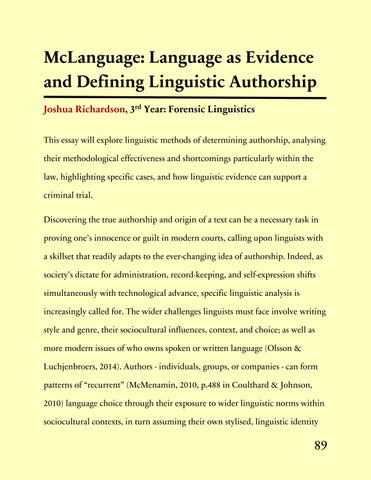McLanguage: Language as Evidence and Defining Linguistic Authorship Joshua Richardson, 3rd Year: Forensic Linguistics This essay will explore linguistic methods of determining authorship, analysing their methodological effectiveness and shortcomings particularly within the law, highlighting specific cases, and how linguistic evidence can support a criminal trial. Discovering the true authorship and origin of a text can be a necessary task in proving one’s innocence or guilt in modern courts, calling upon linguists with a skillset that readily adapts to the ever-changing idea of authorship. Indeed, as society’s dictate for administration, record-keeping, and self-expression shifts simultaneously with technological advance, specific linguistic analysis is increasingly called for. The wider challenges linguists must face involve writing style and genre, their sociocultural influences, context, and choice; as well as more modern issues of who owns spoken or written language (Olsson & Luchjenbroers, 2014). Authors - individuals, groups, or companies - can form patterns of “recurrent” (McMenamin, 2010, p.488 in Coulthard & Johnson, 2010) language choice through their exposure to wider linguistic norms within sociocultural contexts, in turn assuming their own stylised, linguistic identity
89

